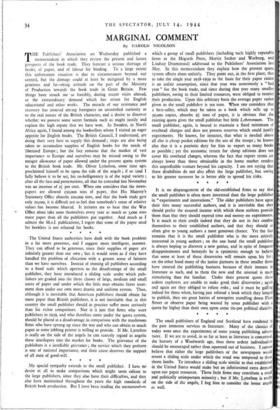My special sympathy extends to the small publisher. I have
no desire at all to make comparisons which might seem odious to the large publishers, since they also have their difficulties, and they also have maintained throughout the years the high standards of British book production. But I have been reading the memorandum which a group of small publishers (including such highly reputable firms as the Hogarth Press, Martin Seeker and Warburg, and Lindsay Drummond) addressed to the Publishers' Association last May. In this memorandum they explain how the present quota system affects them unfairly. They point out, in the first place, that to take the single year 1938-1939 as the basis for their paper ration is an unfair assumption, since that year was notoriously a "bad year" for the book trade, and since during that year many smaller publishers, owing to their limited resources, were obliged to restrict their production. Upon this arbitrary basis the average paper ration given to the small publisher is ten tons. When one considers that a best-seller, which may be taken as a book which sells up to 50,000 copies, absorbs 94 tons of paper, it is obvious that the existing quota gives the small publisher but little Lebensraum. The small publisher, again, is bound to maintain a fixed minimum of overhead charges and does not possess reserves which could justify experiments. He knows, for instance, that what is needed above all else is cheap pocket editions for the use of the troops ; he knows also that it is a patriotic duty for him to export as many books as possible ; yet the economic return for cheap editions does not cover his overhead charges, whereas the fact that export terms are always lower than those obtainable in the home market renders this unprofitable venture beyond his capacity. I ant not saying that these disabilities do not also affect the large publisher, but owing to his greater turnover he is better able to spread his risks.


























 Previous page
Previous page